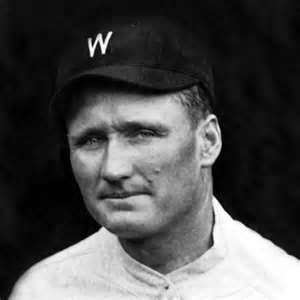Walter Johnson: Baseball's 'Big Train'
"The Big Train" was a descriptive nickname for Walter Johnson, one of the first two pitchers inducted into the Baseball Hall of Fame. A humble Kansas farmhand early in life, he developed a talent and an affinity for playing baseball, specifically for pitching, and he went on to set a large pile of records that have yet to be broken. As high school player in 1905, he pitched all 15 innings of a 0-0 game that ended in a tie. He struck out 27 batters. In a semi-professional league in 1907, he pitched a no-hitter and then a perfect game, in the latter striking out 18. A tall, lanky right-hander, Johnson threw with a sidearm delivery that proved problematic for left-handed and right-handed batters alike. Johnson pitched before the era of the radar gun, so accurate readings of the speed of his fastball don't exist. However, readings recorded by similar instruments estimated that he threw at 91 miles per hours, which would have been far and away the fastest of any Major League pitcher, so much faster than other pitchers that batters would have struggled to catch up with the ball on many an He was so overpowering that he recorded 110 shutouts (holding the opposing team to zero runs) and 38 more games by a score of 1-0. He also lost 26 games 1-0. In total, he won 417 games in his career, against 279 losses. He had 12 20-win seasons (10 in a row) and two 30-win seasons. His career earned run average was 2.17, one of the lowest ever. In 1916, he pitched 369 innings without giving up a home run.
A common theme with strikeout pitchers is that they often walk batters as well. This was definitely not the case with Johnson. A master of control, he walked only 1,405 batters in his entire career, which spanned 5,914 innings.
He threw one no-hitter in the Major Leagues, on July 1, 1920, a 1-0 victory against the Boston Red Sox. He struck out 10 and walked none, but the game wasn't perfect because of an error, by the same teammate who drove in the only run of the game.
Despite his overpowering presence, Johnson often played on unsuccessful teams. The Washington Senators, for whom he played his entire 21-year career, often struggled to compete for the American League pennant. Johnson twice was named the American League Most Valuable Player Award (in 1913 and 1924), but he didn't play every day.
The Senators repeated their pennant-winning success in 1925, but the circumstances were reversed, with Johnson losing the seventh game the second time around. Johnson retired after the 1927 season and later served two stints as manager, of the Senators and then the Cleveland Indians, before retiring from baseball for good in 1935. He was a radio announcer for the Senators in 1939. Johnson was known as an affable fellow on and off the field. Other players consistently referred to him as one of the nicest players in the Major Leagues. He suffered tragedy in his off-the-field life: Both his wife and his daughter died at a young age. He dabbled in politics, winning a role as a county commissioner and running unsuccessfully for the U.S. Congress. In 1936, he became one of the first players inducted into the Baseball Hall of Fame, along with Babe Ruth, Ty Cobb, Christy Mathewson, and Honus Wagner. Walter Johnson died in 1946. |
|
Social Studies for Kids
copyright 2002–2024
David White



 occasion. He led the American League in strikeouts 10 times. He finished his career with 3,508 strikeouts, a record that stood for decades. He once described his fastball this way: "You can't hit what you can't see."
occasion. He led the American League in strikeouts 10 times. He finished his career with 3,508 strikeouts, a record that stood for decades. He once described his fastball this way: "You can't hit what you can't see."
 It was a different story in 1924. Johnson had one of his finer seasons, going 23-7. The Senators made it all the way to the World Series, where Johnson lost the first and fifth games but came on in relief in the seventh and deciding game, pitching four innings of scoreless relief until his team finally scored a run in the 12 inning. The Senators were World Series champions.
It was a different story in 1924. Johnson had one of his finer seasons, going 23-7. The Senators made it all the way to the World Series, where Johnson lost the first and fifth games but came on in relief in the seventh and deciding game, pitching four innings of scoreless relief until his team finally scored a run in the 12 inning. The Senators were World Series champions.

